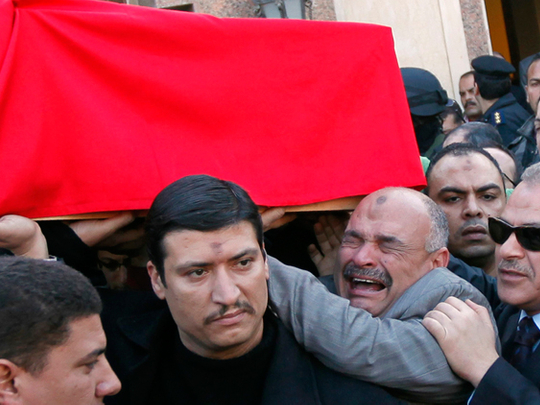
Cairo: This week’s killing of a senior security official in Cairo, the latest attack targeting security personnel, exposes gaping holes in the police’s ability to protect officials, according to experts.
On Tuesday, two masked gunmen on a motorbike shot dead Major General Mohammad Al Saeed, an aide to the interior minister, near his house in the Pyramids area in Cairo and fled.
The attack came two months after another senior police official, Colonel Mohammad Mabruk, was gunned down near his house in the eastern Cairo quarter of Nasr City.
In September, Interior Minister Mohammad Ebrahim survived an assassination attempt when a car bomb hit his convoy near his house in Nasr City.
“These assassinations were not surprising as Egypt is fighting a war of terrorism,” said Mamduh Abdul Halim, a security expert. “With due appreciation to all its efforts and sacrifices, the Interior Ministry has not provided enough protection for its senior officials, who must be on terrorists’ hit lists,” Abdul Halim told Gulf News.
Egypt has seen a string of attacks mainly targeting security forces since the military ousted Islamist president Mohammad Mursi in July. The assaults, including Tuesday’s killing, have been mostly claimed by Ansar Beit Al Maqdis, an Al Qaida-inspired group based in Egypt’s Sinai.
The military-installed government has blamed the violence on Mursi’s Muslim Brotherhood and designated it as a terrorist group. The Brotherhood has denied involvement and accused authorities of manipulating the attacks to quash political dissent.
“During his one year in power, Mursi and the Brotherhood had access to sensitive information about the Interior Ministry on the pretext of restructuring the ministry,” said Abdul Halim. “This information was also related to the officers, who took part in fighting religious extremism and handling the Brotherhood during Mubarak’s days,” he said, referring to Mursi’s predecessor, Hosni Mubarak toppled in a 2011 uprising. The Brotherhood was banned and suppressed under Mubarak’s 30-year-old rule.
“Therefore, the Interior Ministry should increase security around its senior officials and relocate their residences.”
Brotherhood-linked websites have recently published addresses of police officers who had allegedly participated in a deadly crackdown on two pro-Mursi protest camps in Cairo in August.
“We should expect more assassination operations targeting police officers and other officials in the coming period, as the country is moving towards presidential elections,” said Abdul Halim.
Egypt is expected to vote in March for a new president, part of a transitional plan announced by the military following Mursi’s overthrow. The formula also provides for a constitutional revision, already endorsed in a public vote earlier this month, and parliamentary elections expected in summer.
In the wake of Al Saeed’s murder, the Interior Ministry’s spokesman Hani Abdul Latif disclosed that an internal security department has been set up to monitor the ministry’s personnel to detect any suspected informants or whistle-blowers.
“We are fighting a terrorist organisation, which is reeling after successful security blows dealt to it,” said Abdul Latif in televised remarks. “Policemen, backed by the people and the army, are in high spirits and will vanquish the terrorists as in the 1990s,” he added, referring to a decade-long showdown between Mubarak’s government and Islamists.
Earlier this week, interim President Adly Mansour has threatened unspecified “exceptional measures” after the increase in attacks against security facilities including a bomb attack on Friday against the Egyptian capital’s police headquarters.












